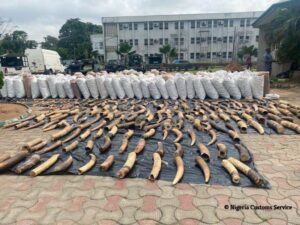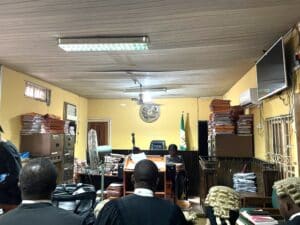Nigeria has gained a reputation as one of Africa’s main wildlife trafficking hubs, with criminals taking advantage of high levels of corruption and poor law enforcement. Lagos is one of Africa’s primary exit points for large shipments of elephant ivory, pangolin scales, and other illegal wildlife products. These flow from West, Central and Southern Africa, are consolidated in Nigeria, and shipped on to Vietnam and elsewhere in Asia.
Although the COVID-19 pandemic slowed the movement, subsequent seizures indicate that ivory continues to move between Nigeria and Vietnam. Since 2020, at least 6 tonnes of ivory have been intercepted implicating both Vietnam and Nigeria. This includes a seizure of 490 kg of ivory from Nigeria in Vietnam in February 2023.
However, the tide may be slowly turning. Nigerian agencies, particularly the Nigeria Customs Service, supported by conservation partners including ECF grantees Wildlife Justice Commission, Environmental Investigation Agency UK, and Focused Conservation, have conducted investigations against the most significant trafficking networks operating between Nigeria and Asia, particularly Vietnam.
Networks have been infiltrated, and ivory, pangolin scales and other wildlife products seized. High level targets – including Vietnamese nationals – have been arrested and successfully prosecuted in Nigeria. Although the sentences handed down have been considered too lenient by many, in a legal system where the majority of wildlife crime cases do not reach prosecution stage, let alone conviction, these cases represent significant positive steps in investigating and prosecuting wildlife crime in Nigeria.
While it is clear that significant efforts have been made over recent years by Nigerian authorities, particularly Nigeria Customs Service, to address the illegal wildlife trade, there is indisputably a lot more to do. Prosecutions against traffickers are too few, and cases are too slow to progress through the legal system and to reach sentencing.
It is hoped that this will change with the enactment of Nigeria’s new Endangered Species Conservation and Protection Bill, 2022. ECF partners including Environmental Investigation Agency UK and Africa Nature Investors have collaborated on this Bill, which is slowly working its way through the approval process. Once signed into law, it will increase investigative powers, including for financial investigations and intelligence-led operations, will increase penalties for wildlife crime, and strengthen the ability of courts to recover assets. It will also support increased international collaboration and make Nigeria compliant with international conventions on endangered species, organized crime and corruption.
With ECF funding, Environmental Investigation Agency UK has undertaken courtroom monitoring in Nigeria and capacity building within law enforcement and the judiciary, with a particular focus on financial investigation techniques. ECF support has also allowed Focused Conservation to build investigative capacity with Nigerian authorities.
We are now seeing all these efforts slowly impact on the willingness and ability of criminals to operate. Traffickers are acting more cautiously, taking less risks and seemingly more wary of the consequences. With sustained effort, Nigeria can become a country where wildlife crime is no longer tolerated. However, we cannot reduce the pressure on these criminals, and continued investment from the ECF, only possible thanks to the generosity of our dedicated supporters, is essential.


